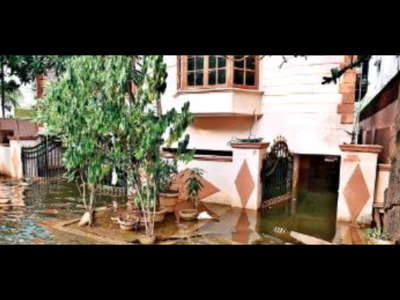The Hindu 25.02.2010
‘Disqualify seven corporators’
Staff Correspondent
| They had defected from the JD(S) to the BJP |
— PHOTO: M.A. SRIRAM 
Advocate Venugopal (right) submitting a petition to Regional Commissioner M.V. Jayanthi in Mysore on Wednesday.
MYSORE: A complaint was submitted to Regional Commissioner M.V. Jayanthi seeking disqualification of seven corporators from the Mysore City Corporation (MCC) Council under the Karnataka Local Authorities (Prohibition of Defection) Act, 1987.
The complainants, S. Murali and B. Umesh, who are also corporators, urged the Regional Commissioner to restraint the seven corporators (respondents) from exercising their franchise in the coming mayoral election and attending meetings and proceedings of the MCC Council, pending disposal of the complaint.
Senior advocate Venugopal, who appeared for the complainants, appealed to the Regional Commissioner to disqualify the seven respondents as corporators under Section 26 (2) of the Karnataka Municipal Corporation Act, 1976.
Chief Minister’s Parliamentary Secretary and MLA S.A. Ramdas was present when the complaint was submitted.
The seven corporators are T. Devaraj (Ward 34), R. Lingappa (Ward 20), K.V. Mallesh (Ward 18), Prabhumurthy (Ward 9), Kempamma (Ward 13), Laxmamma (Ward 48) and Kamruddin (Ward 55).
In their memorandum, the complainants stated that the seven corporators after defecting from the Janata Dal (Secular) obtained the primary membership of the Bharatiya Janata Party (BJP). “After voluntarily coming out of their original party (on which they won the election), the seven corporators joined the BJP. After joining the BJP, they also voted in favour of it and became chairmen of the standing committees of the MCC,” they alleged. “These corporators committed offences under Section 3 (1) (A) and (B) of the Karnataka Local Authorities (Prohibition of Defection) Act,” they alleged. Mr. Venugopal argued that the respondents could not escape from being disqualified as corporators for reasons such as: the seven corporators claiming protection on the basis of a split in their party must prove it, protection under Section 3 (A) of the Act applied only when there was a split in their original party (JD-S), any kind of split in the local unit or in the State unit of the party was not sufficient to claim protection from under Section 3 (A) of the Act, and the JD(S) was a recognised national political party and there had been no split in it.
The complainants submitted that the respondents had applied to the MCC Council Secretary, Mayor and the Commissioner in their letter dated July 3, 2008, requesting a separate sitting arrangement in the Council hall as they had come out of the JD(S) and treat them as a separate group as it had more than 1/3rd of the total members of the JD(S) and their had not merged with any political party. Their application was considered by the MCC, they said. The Regional Commissioner said that she would look into the complaint and reserved her reply.


